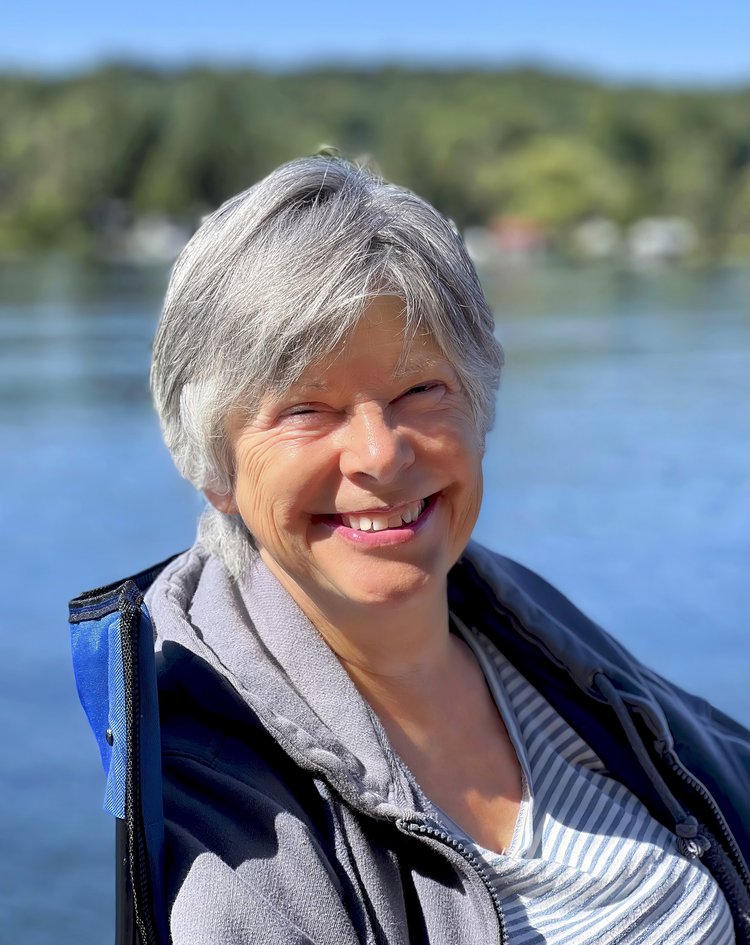 I was playing around with Google Earth, zooming in on the street I lived on many years ago in Arkansas (so changed!) Then I picked my current Traverse City address and watched the pointer take off into the sky like a little red rocket, Arkansas grow tiny and distant, and I land, breathless, among the spires of the Commons, where we live. It’s dizzying. You land and fly, the earth rotates at your whim.
I was playing around with Google Earth, zooming in on the street I lived on many years ago in Arkansas (so changed!) Then I picked my current Traverse City address and watched the pointer take off into the sky like a little red rocket, Arkansas grow tiny and distant, and I land, breathless, among the spires of the Commons, where we live. It’s dizzying. You land and fly, the earth rotates at your whim.  I get on a plane in a lull between snowstorms, wait on the runway while the de-icer circles and circles for what seems like 45 minutes, then several hours later I land in Cancun. It is balmy, humid after a shower, around 80 degrees. A few days later I return to Traverse City in a blessed lull before another huge snow. Jerry picks me up, my boots and gloves in his car so I can endure even the short walk into our building. Today it's 1 degree.
I get on a plane in a lull between snowstorms, wait on the runway while the de-icer circles and circles for what seems like 45 minutes, then several hours later I land in Cancun. It is balmy, humid after a shower, around 80 degrees. A few days later I return to Traverse City in a blessed lull before another huge snow. Jerry picks me up, my boots and gloves in his car so I can endure even the short walk into our building. Today it's 1 degree. Time and space are so weird. It was a lot easier to convince ourselves that they had some concrete meaning ,before we could space-travel like that. Before Einstein, it seemed that If we flew far enough into space, well, that we could still keep sensible time, if the observer could somehow stand on a fixed point, like a pin.
Time and space are so weird. It was a lot easier to convince ourselves that they had some concrete meaning ,before we could space-travel like that. Before Einstein, it seemed that If we flew far enough into space, well, that we could still keep sensible time, if the observer could somehow stand on a fixed point, like a pin.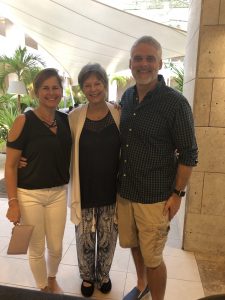 Cancun, you say? Kelly and Scott, my two children, and I took a little vacation, just for us. Just being with them is time travel. If we really, really saw how strange life is—there was nothing. (I started to write, “First” there was nothing, but there was no first. I can’t trace back far enough to find a nothing.) Then there were my babies, and now there are these grown people, getting wrinkles and a beard. (Scott, that is.) We text each other from room to room. My father checks in with me from Northern Michigan. There is no space. And time is like a telescope that you can turn around and look in either end. The sun shone the day we got there. It was a little chilly and very windy, but we swam in the ocean. Good thing, because after that it poured almost the whole time. In the brief interstices, we took walks and swam in the many pools of our gorgeous, luxurious resort. We ate. We had our complimentary 45-minute hydrotherapy session. We talked.
Cancun, you say? Kelly and Scott, my two children, and I took a little vacation, just for us. Just being with them is time travel. If we really, really saw how strange life is—there was nothing. (I started to write, “First” there was nothing, but there was no first. I can’t trace back far enough to find a nothing.) Then there were my babies, and now there are these grown people, getting wrinkles and a beard. (Scott, that is.) We text each other from room to room. My father checks in with me from Northern Michigan. There is no space. And time is like a telescope that you can turn around and look in either end. The sun shone the day we got there. It was a little chilly and very windy, but we swam in the ocean. Good thing, because after that it poured almost the whole time. In the brief interstices, we took walks and swam in the many pools of our gorgeous, luxurious resort. We ate. We had our complimentary 45-minute hydrotherapy session. We talked.  I think talking is how we resolve the insanity of time and space so we can live with it. “Once Upon a Time” is how we make up a starting place. The three of us, well, we share a lot of past difficulty. We've washed up here on this beautiful beach after a mighty storm. Here we are, making a now, in which pterodactyl-looking large birds with split tails gather and disperse. I look them up. They’re swallow-tail kites. We walk far down the beach, pick up what I think is a sea grape on the sand. We don’t have our phones, so we can’t look it up. Kelly squishes it and water spurts out. A man is windsurfing. He lifts off and lands, does a fierce dance in the hard wind.Astrophysicist Neil deGrasse Tyson says “Time is defined to make motion look simple. You can’t describe motion without some reference to time.” The way he puts it, time makes us all a prisoner of the present, forever transitioning from our own past into an unknown future.”Astronomers invented timekeeping. You could say they invented time. As long as you have sun and moon rising and setting, birthdays, births and deaths, as long as you have things that repeat, he says “you can keep track of time even if you have no freaking idea what's going on.”
I think talking is how we resolve the insanity of time and space so we can live with it. “Once Upon a Time” is how we make up a starting place. The three of us, well, we share a lot of past difficulty. We've washed up here on this beautiful beach after a mighty storm. Here we are, making a now, in which pterodactyl-looking large birds with split tails gather and disperse. I look them up. They’re swallow-tail kites. We walk far down the beach, pick up what I think is a sea grape on the sand. We don’t have our phones, so we can’t look it up. Kelly squishes it and water spurts out. A man is windsurfing. He lifts off and lands, does a fierce dance in the hard wind.Astrophysicist Neil deGrasse Tyson says “Time is defined to make motion look simple. You can’t describe motion without some reference to time.” The way he puts it, time makes us all a prisoner of the present, forever transitioning from our own past into an unknown future.”Astronomers invented timekeeping. You could say they invented time. As long as you have sun and moon rising and setting, birthdays, births and deaths, as long as you have things that repeat, he says “you can keep track of time even if you have no freaking idea what's going on.”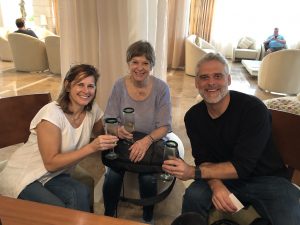 I have no idea what’s going on. Images of how it used to be float in my mind, but they shift and morph. My children, my grandchildren, are different every time I see them. I’m different. We have our ideas of each other. We are crazy about each other. It’s like being crazy about the waves. That guy out there, holding on for dear life to his harness is crazy about what he’s doing. He may be just plain crazy. But it looks like he’s having a good time, playing with the whitecapped sea.P.S. I am so sorry not to have accepted the comments on my last post more quickly, so they became visible. The new format makes me have to go look for your comments instead of notifying me when they're posted. I'll try to do better.
I have no idea what’s going on. Images of how it used to be float in my mind, but they shift and morph. My children, my grandchildren, are different every time I see them. I’m different. We have our ideas of each other. We are crazy about each other. It’s like being crazy about the waves. That guy out there, holding on for dear life to his harness is crazy about what he’s doing. He may be just plain crazy. But it looks like he’s having a good time, playing with the whitecapped sea.P.S. I am so sorry not to have accepted the comments on my last post more quickly, so they became visible. The new format makes me have to go look for your comments instead of notifying me when they're posted. I'll try to do better.
Archive
My Wobbly Bicycle, 163
 Yesterday we undressed the tree, old ornament by old ornament. We pulled apart the fake tree, bought five or six years ago from Brookstone. It’s held up well and is as pretty as a not-tree can be. We stuffed its million needles with its million lights into its large box, with its layers of duct tape. We put the box on the hand-truck and I pulled it to the elevator and downstairs to the car, where I balanced it so that it would pivot into the back (with the seats down) without having to do much heavy lifting.Jerry would love to help, but can’t. I took it to our storage unit (no storage in this historic building) and reversed the process. Even being careful, my back hurts today. I see this is how it is, you get to be a certain age and things hurt. Just vague aches, so far.
Yesterday we undressed the tree, old ornament by old ornament. We pulled apart the fake tree, bought five or six years ago from Brookstone. It’s held up well and is as pretty as a not-tree can be. We stuffed its million needles with its million lights into its large box, with its layers of duct tape. We put the box on the hand-truck and I pulled it to the elevator and downstairs to the car, where I balanced it so that it would pivot into the back (with the seats down) without having to do much heavy lifting.Jerry would love to help, but can’t. I took it to our storage unit (no storage in this historic building) and reversed the process. Even being careful, my back hurts today. I see this is how it is, you get to be a certain age and things hurt. Just vague aches, so far. Age is interesting. It’s a foreign land that arrives without your having to travel to it. Little things: these spots on my hands, for example. They breed when I’m not looking. My brain processes more slowly. It doesn’t like fast talk. I could go on and you’ll either be saying, oh yes, I know what you mean, or you’ll be saying oh, really? If you don’t live here yet.From here, I can see the arc of my life. As if I were in a spaceship, there is the curvature. Not back to the beginning, but the beginning seems closer, as if I’ve curved far enough to encounter it again. Emily Webb, in Wilder’s play Our Town was able to return and find the same scenes being replayed. That’s not what I mean. I mean I feel closer to the long-gone past. It returns like a reverie. I’m not a character in it; I am both me, now, and my early self that still lives in my bones.Or, you could say I am like a plant that's reached its full height, bloomed its blooms, and is now beginning to remember its roots, its connection to the earth, not so much reaching for the sun.
Age is interesting. It’s a foreign land that arrives without your having to travel to it. Little things: these spots on my hands, for example. They breed when I’m not looking. My brain processes more slowly. It doesn’t like fast talk. I could go on and you’ll either be saying, oh yes, I know what you mean, or you’ll be saying oh, really? If you don’t live here yet.From here, I can see the arc of my life. As if I were in a spaceship, there is the curvature. Not back to the beginning, but the beginning seems closer, as if I’ve curved far enough to encounter it again. Emily Webb, in Wilder’s play Our Town was able to return and find the same scenes being replayed. That’s not what I mean. I mean I feel closer to the long-gone past. It returns like a reverie. I’m not a character in it; I am both me, now, and my early self that still lives in my bones.Or, you could say I am like a plant that's reached its full height, bloomed its blooms, and is now beginning to remember its roots, its connection to the earth, not so much reaching for the sun.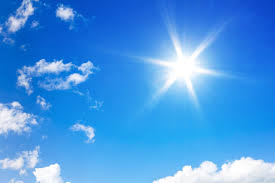 I do love the sun. I’m super aware of it, since we moved this far north. And since we moved to this condo with its fourteen windows. I’m aware of it in a primitive way, like the plant. When I was younger, it hung up there in the sky solely for my benefit. It was the tool that would tan me, make my pimples dry up, bleach my hair, and melt my bones if I lay on a towel on the beach long enough.Now we are in collusion. I see now that the sun and I are part of the same system. We're different aspects of the same swirl. I am gradually changing, as is the sun. If you were watching when we both burned out, you would hardly see a difference because (one hopes) it would all have been so gradual. Like these spots on my hands.
I do love the sun. I’m super aware of it, since we moved this far north. And since we moved to this condo with its fourteen windows. I’m aware of it in a primitive way, like the plant. When I was younger, it hung up there in the sky solely for my benefit. It was the tool that would tan me, make my pimples dry up, bleach my hair, and melt my bones if I lay on a towel on the beach long enough.Now we are in collusion. I see now that the sun and I are part of the same system. We're different aspects of the same swirl. I am gradually changing, as is the sun. If you were watching when we both burned out, you would hardly see a difference because (one hopes) it would all have been so gradual. Like these spots on my hands.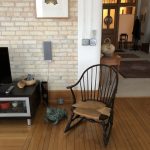 There’s always a few days of feeling the bareness after the tree and the lights are gone. (Photo is where the tree used to be) Back to the ordinary. But it’s also a relief. One can celebrate only so long. And sometimes even that’s too much. Ordinary life is amazing enough. I’m intensely aware of being alive. Having had cancer does that to you. “Oh, earth,” Emily Webb exclaims towards the end of Our Town, “you’re too wonderful for anyone to realize you.”Speaking of wonderful, Nicholas Kristof’s column in the New York Times this Sunday was titled, “Why 2018 Was the Best Year in Human History. ”He wrote, Each day on average, about another 295,000 people around the world gained access to electricity for the first time. . . Every day, another 305,000 were able to access clean drinking water for the first time. . . Never before has such a large portion of humanity been literate, enjoyed a middle-class cushion, lived such long lives, had access to family planning or been confident that their children would survive.” And, he writes, “The big news that won’t make a headline and won’t appear on television is that 15,000 children died around the world in the last 24 hours. But in the 1990s, it was 30,000 kids dying each day.”What’s the point of this post? I think it’s that there is joy and sadness, kids and old people, and the rotation of the earth around the sun. Good enough?
There’s always a few days of feeling the bareness after the tree and the lights are gone. (Photo is where the tree used to be) Back to the ordinary. But it’s also a relief. One can celebrate only so long. And sometimes even that’s too much. Ordinary life is amazing enough. I’m intensely aware of being alive. Having had cancer does that to you. “Oh, earth,” Emily Webb exclaims towards the end of Our Town, “you’re too wonderful for anyone to realize you.”Speaking of wonderful, Nicholas Kristof’s column in the New York Times this Sunday was titled, “Why 2018 Was the Best Year in Human History. ”He wrote, Each day on average, about another 295,000 people around the world gained access to electricity for the first time. . . Every day, another 305,000 were able to access clean drinking water for the first time. . . Never before has such a large portion of humanity been literate, enjoyed a middle-class cushion, lived such long lives, had access to family planning or been confident that their children would survive.” And, he writes, “The big news that won’t make a headline and won’t appear on television is that 15,000 children died around the world in the last 24 hours. But in the 1990s, it was 30,000 kids dying each day.”What’s the point of this post? I think it’s that there is joy and sadness, kids and old people, and the rotation of the earth around the sun. Good enough?
My Wobbly Bicycle, 162
 I remember series-wired Christmas bulbs, waiting in my youthful despair as my father crawled around on his knees, testing one after the other to find the bad one so the string would come back on. I remember bubble lights (same story), and large round pink lights (my grandmother’s idea of being contemporary), and then strands of tiny lights. Our current tree came pre-wired with hundreds of tiny white lights. Actually, we have three trees in our condo: the big one, a tiny one made of sticks, and a medium size one, a cone that I put baby lights on. Everything is so sparkly. And so dark outside. I write this early on Christmas Eve morning. It’s snowing.
I remember series-wired Christmas bulbs, waiting in my youthful despair as my father crawled around on his knees, testing one after the other to find the bad one so the string would come back on. I remember bubble lights (same story), and large round pink lights (my grandmother’s idea of being contemporary), and then strands of tiny lights. Our current tree came pre-wired with hundreds of tiny white lights. Actually, we have three trees in our condo: the big one, a tiny one made of sticks, and a medium size one, a cone that I put baby lights on. Everything is so sparkly. And so dark outside. I write this early on Christmas Eve morning. It’s snowing.  Of course in the darkest part of the year, humans thought of lights. Christian or not, the natural metaphor is that a light in the darkness represents hope. Alas, there is so much that’s dark besides the skies! Last night I was reading an essay by Jonathan Franzen that I had to put down and change books. Considering my tendency to be depressed at Christmas, I wasn’t going to go to sleep with that much despair filtering though my system. He was cataloging birds, describing the loss of our birds, of our planet, basically. What sort of hope shall I have? That something apocalyptic will turn things around? It’s too late for humans to restore the planet without divine intervention. All we can do, at best, is to slow the destruction. (And I am deeply grateful for those who are giving their lives to this effort.) I could rage with anger at the blindness that’s led to this mess, but mostly I’m in mourning for our grandchildren.
Of course in the darkest part of the year, humans thought of lights. Christian or not, the natural metaphor is that a light in the darkness represents hope. Alas, there is so much that’s dark besides the skies! Last night I was reading an essay by Jonathan Franzen that I had to put down and change books. Considering my tendency to be depressed at Christmas, I wasn’t going to go to sleep with that much despair filtering though my system. He was cataloging birds, describing the loss of our birds, of our planet, basically. What sort of hope shall I have? That something apocalyptic will turn things around? It’s too late for humans to restore the planet without divine intervention. All we can do, at best, is to slow the destruction. (And I am deeply grateful for those who are giving their lives to this effort.) I could rage with anger at the blindness that’s led to this mess, but mostly I’m in mourning for our grandchildren.  But it’s Christmas Eve! Let us bring back the light, let us rejoice in the rotation that returns light to the planet! Let us learn from African Americans who sang the most glorious gospel songs in the middle of their torment. I think the most human thing we can do is sing—or dance, or play music, or write poems, or do any sort of art—in the dead center of our grief. Consider the musician who played the violin as the Titanic sank into the waves. Will we erect enough solar panels, windmills? Will we stop the mining of coal? Will we be able to continue along the path of the Enlightenment, or will we sink into a dark age of superstition and fake news? One of the wisest people I’ve known said to me once, when I was in despair, “Fleda, nothing lasts forever, does it? The earth itself will burn up eventually.”
But it’s Christmas Eve! Let us bring back the light, let us rejoice in the rotation that returns light to the planet! Let us learn from African Americans who sang the most glorious gospel songs in the middle of their torment. I think the most human thing we can do is sing—or dance, or play music, or write poems, or do any sort of art—in the dead center of our grief. Consider the musician who played the violin as the Titanic sank into the waves. Will we erect enough solar panels, windmills? Will we stop the mining of coal? Will we be able to continue along the path of the Enlightenment, or will we sink into a dark age of superstition and fake news? One of the wisest people I’ve known said to me once, when I was in despair, “Fleda, nothing lasts forever, does it? The earth itself will burn up eventually.”  Does that sound unfairly gloomy, to recall at Christmas? I’m sorry. Actually, I was just at this moment feeling pretty cheery. I was thinking of how amazing humans are, with our sparkly consciousness. I don’t know how long we’ll last on this planet, but then, I don’t know if anyone will read a thing I’ve written after I’m gone. That doesn’t stop me from writing. It’s the unnecessary quality of art that matters. Is that a contradiction? it flies out of us like angels. It is the spirit of us, made visible, made tangible, made audible. Aliveness is made of the transitory. It IS the transitory. They are one in the same, no separation.
Does that sound unfairly gloomy, to recall at Christmas? I’m sorry. Actually, I was just at this moment feeling pretty cheery. I was thinking of how amazing humans are, with our sparkly consciousness. I don’t know how long we’ll last on this planet, but then, I don’t know if anyone will read a thing I’ve written after I’m gone. That doesn’t stop me from writing. It’s the unnecessary quality of art that matters. Is that a contradiction? it flies out of us like angels. It is the spirit of us, made visible, made tangible, made audible. Aliveness is made of the transitory. It IS the transitory. They are one in the same, no separation.  So, with that in mind, I have to say I’m actually feeling really happy right now. Merry Christmas, or Merry whatever name you like to fasten to the return of light!
So, with that in mind, I have to say I’m actually feeling really happy right now. Merry Christmas, or Merry whatever name you like to fasten to the return of light!
My Wobbly Bicycle, 161
A few flags are still at half-mast for George H. W. Bush. Some of us didn’t like him any better than we liked Ronald Reagan. Yet as I listened to the tributes to Bush when he died, I heard them—probably you did too— foregrounded by the depravity of our current president. Now we see with different eyes. A friend reminded me that George H. W. Bush signed the Americans with Disabilities Act.Which matters to me personally. Jerry has needed, at different times in the last few years, a wheelchair, a walker, and a cane. I’m alert for the curb, the high step, the steep incline, the lack of handrails, the narrow aisles. I can’t tell you how grateful I am for the sloping curbs with non-skid nubs.My awareness has been sharpened gradually. My father’s been in a wheelchair for over four years, since the aneurysm in his leg couldn’t be repaired and the leg had to be amputated. My sister had to use a walker for a while. You can’t really see what’s needed until you’re there.
A friend reminded me that George H. W. Bush signed the Americans with Disabilities Act.Which matters to me personally. Jerry has needed, at different times in the last few years, a wheelchair, a walker, and a cane. I’m alert for the curb, the high step, the steep incline, the lack of handrails, the narrow aisles. I can’t tell you how grateful I am for the sloping curbs with non-skid nubs.My awareness has been sharpened gradually. My father’s been in a wheelchair for over four years, since the aneurysm in his leg couldn’t be repaired and the leg had to be amputated. My sister had to use a walker for a while. You can’t really see what’s needed until you’re there.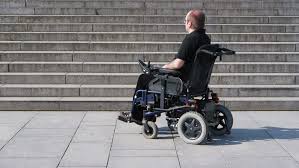 People tend not to see clearly until they’re made to see. When the sea water laps at our feet, we will all finally see. In the case of disabilities, no one much noticed what was needed until Bush signed the ADA in 1990. No, that’s not quite right. What I remember is what was unspoken: “That’s too bad. We’ll help lift your wheelchair over the curb, but there are some places you just can’t go.” Or, “You can’t be a Walmart greeter because you’re in a wheelchair. We don’t want to project that image.”I don’t ever remember seeing a bus with a wheelchair lift.Making a law, of course, is ever so much better than relying on random kindnesses. It changes the relationship between those who need help and those who help. In all cases. In this particular case, it elevates the disabled to citizens with full rights, not people to be pitied. It costs money to remodel a bathroom. A lot of businesses raised hell, but after a string of successful lawsuits, things started to change.But beyond laws, there’s seeing. Sensitivity. A friend who’s used a wheelchair for years told me of being stuck in a pubic bathroom all night, alone, because the door was too heavy, the handle in the wrong position for her, and her cellphone had died. She said she yelled, she pounded on the door, she sang, and finally just slept. The next morning the custodian came in and screamed at the woman slumped in the chair.Sensitivity to what’s needed requires seeing the other person. It requires being the other person.Let’s see. If I were in a wheelchair, could I push this door open?
People tend not to see clearly until they’re made to see. When the sea water laps at our feet, we will all finally see. In the case of disabilities, no one much noticed what was needed until Bush signed the ADA in 1990. No, that’s not quite right. What I remember is what was unspoken: “That’s too bad. We’ll help lift your wheelchair over the curb, but there are some places you just can’t go.” Or, “You can’t be a Walmart greeter because you’re in a wheelchair. We don’t want to project that image.”I don’t ever remember seeing a bus with a wheelchair lift.Making a law, of course, is ever so much better than relying on random kindnesses. It changes the relationship between those who need help and those who help. In all cases. In this particular case, it elevates the disabled to citizens with full rights, not people to be pitied. It costs money to remodel a bathroom. A lot of businesses raised hell, but after a string of successful lawsuits, things started to change.But beyond laws, there’s seeing. Sensitivity. A friend who’s used a wheelchair for years told me of being stuck in a pubic bathroom all night, alone, because the door was too heavy, the handle in the wrong position for her, and her cellphone had died. She said she yelled, she pounded on the door, she sang, and finally just slept. The next morning the custodian came in and screamed at the woman slumped in the chair.Sensitivity to what’s needed requires seeing the other person. It requires being the other person.Let’s see. If I were in a wheelchair, could I push this door open? Okay, the über rational would say, helping damaged people only weakens the gene pool so that a greater and greater percentage of people are born deficient. Before I get all righteously indignant at that cold thought, I wonder myself, how many people can we let into the country, how many starving people can we save, how many sick people can we afford to cure?But damn, what does it mean to be human? We have these massive brains. So do robots. But humans can feel what others feel. We have an astounding combination of problem-solving power and complex emotions. We have the possibility of seeing beyond the mundane.What are we going to do, then? I don’t know, but it seems to me that if we want to remain human, there’s no choice but to suffer with those who suffer, make decisions based on compassion even if it mightily inconveniences us. “For what shall it profit a man, if he shall gain the whole world, and lose his own soul?” That’s from the book of Mark, but I’m sure it appears in all religious traditions. I’d suggest it for a major campaign slogan for the next election.When he signed the Americans with Disabilities Act, George H. W. Bush’s ended his remarks like this:“I now lift my pen to sign this Americans with Disabilities Act and say: Let the shameful wall of exclusion finally come tumbling down. God bless you all.”
Okay, the über rational would say, helping damaged people only weakens the gene pool so that a greater and greater percentage of people are born deficient. Before I get all righteously indignant at that cold thought, I wonder myself, how many people can we let into the country, how many starving people can we save, how many sick people can we afford to cure?But damn, what does it mean to be human? We have these massive brains. So do robots. But humans can feel what others feel. We have an astounding combination of problem-solving power and complex emotions. We have the possibility of seeing beyond the mundane.What are we going to do, then? I don’t know, but it seems to me that if we want to remain human, there’s no choice but to suffer with those who suffer, make decisions based on compassion even if it mightily inconveniences us. “For what shall it profit a man, if he shall gain the whole world, and lose his own soul?” That’s from the book of Mark, but I’m sure it appears in all religious traditions. I’d suggest it for a major campaign slogan for the next election.When he signed the Americans with Disabilities Act, George H. W. Bush’s ended his remarks like this:“I now lift my pen to sign this Americans with Disabilities Act and say: Let the shameful wall of exclusion finally come tumbling down. God bless you all.” Something there is that does not love a wall.
Something there is that does not love a wall.
My Wobbly Bicycle, 160
On the seat in front of me on the plane, a young woman is splaying her fingers to admire again her long pointed nails, sparkly blue claws. We should have trimmed Wally’s claws before we left, I think. When we rolled our bags out the door at six in the morning, he was sitting perfectly still, forlorn, I might imagine, eyes large, knowing it was useless to try to follow. This had happened before, he knew, all to no good. 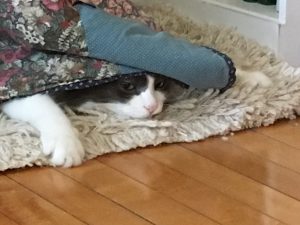 Travel is like a dream. You see where you are, but you are also back there, where you left. You travel through the years, too, but you are also back there, in that body that seems like this one, but you know it used to be a lot more agile. We are on our way to D.C. to spend Thanksgiving with our children and grandchildren. It is a hard journey for Jerry, who walks very slowly, with a cane. He needs a wheelchair for distance. I’m nervous because we have a short connection-time in Chicago. If the wheelchair arrives late, we’ll miss our flight. Back to Wally: I was beginning cancer treatment when we got him. He’s comforted both of us during the last six years. He came to us, the most gorgeous stray you could ever imagine, huge, obviously with Maine Coon blood in him, long white and gray fur, a ruff at his neck. Well, he wasn’t huge when we got him. He wore the evidence of his sojourn, however long it was, in the wilderness, fighting to survive. When he was taken in, he weighed half his normal weight and for several days had been reaching for the doorknob at the Civic Center, in the dead of winter. He was offered to us on a trial basis, which lasted until the second he emerged from his carrying case.
Travel is like a dream. You see where you are, but you are also back there, where you left. You travel through the years, too, but you are also back there, in that body that seems like this one, but you know it used to be a lot more agile. We are on our way to D.C. to spend Thanksgiving with our children and grandchildren. It is a hard journey for Jerry, who walks very slowly, with a cane. He needs a wheelchair for distance. I’m nervous because we have a short connection-time in Chicago. If the wheelchair arrives late, we’ll miss our flight. Back to Wally: I was beginning cancer treatment when we got him. He’s comforted both of us during the last six years. He came to us, the most gorgeous stray you could ever imagine, huge, obviously with Maine Coon blood in him, long white and gray fur, a ruff at his neck. Well, he wasn’t huge when we got him. He wore the evidence of his sojourn, however long it was, in the wilderness, fighting to survive. When he was taken in, he weighed half his normal weight and for several days had been reaching for the doorknob at the Civic Center, in the dead of winter. He was offered to us on a trial basis, which lasted until the second he emerged from his carrying case. 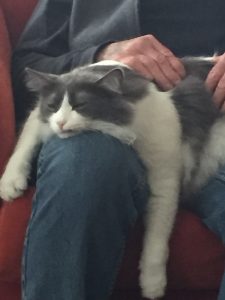 Our Wally has a crooked smile because we had one of his large canine teeth extracted. It was broken and we imagined it caused him pain. Who knows? He’s probably an old guy. He’s a bit un-cat-like, the opposite of aloof. He follows us everywhere, rolls over to have his stomach rubbed. He costs us money. We hire a cat-sitter when we travel. He would be devastated if we boarded him, we speculate.
Our Wally has a crooked smile because we had one of his large canine teeth extracted. It was broken and we imagined it caused him pain. Who knows? He’s probably an old guy. He’s a bit un-cat-like, the opposite of aloof. He follows us everywhere, rolls over to have his stomach rubbed. He costs us money. We hire a cat-sitter when we travel. He would be devastated if we boarded him, we speculate. 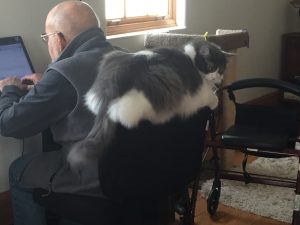 But who knows? There are cat-signals: tail in the air for happy, tail tucked under for unhappy or scared, but beyond that is guesswork. How old does Wally think he is? Whatever, he's been good for Jerry. When Jerry’s been in pain, he’s had his living lap-rug. Whatever door Jerry closes, Wally stands outside it and waits for his dear one to emerge. In the mornings, when Jerry's reading the Times online, Wally perches precariously on on the narrow ridge at the back of his desk chair to keep in touch. And he helps him do his exercises.
But who knows? There are cat-signals: tail in the air for happy, tail tucked under for unhappy or scared, but beyond that is guesswork. How old does Wally think he is? Whatever, he's been good for Jerry. When Jerry’s been in pain, he’s had his living lap-rug. Whatever door Jerry closes, Wally stands outside it and waits for his dear one to emerge. In the mornings, when Jerry's reading the Times online, Wally perches precariously on on the narrow ridge at the back of his desk chair to keep in touch. And he helps him do his exercises. 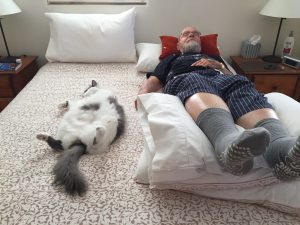 He is our house-spirit. Cat-spirit is not like dog-spirit. It’s silent, for the most part. It gently animates the surroundings; it reminds us that the universe is alive, beyond us, but it does this by sleeping most of the time. Cat-spirit-sleeping is a visual of peace in the valley, a sign that there is no point making a fuss over things you can’t fix. That the warmest place to be is near another spirit, or on top of it, getting your ears rubbed. Cat spirit knows it is worthy of being rubbed, and is content to collect its due. Spirits arrive unbidden, always, it seems, from somewhere out in the cold, and make glad our temporary lives. We can’t create them, but we can take care of them, as long as they can stay. Wow, I guess that sounds like a Christmas story.
He is our house-spirit. Cat-spirit is not like dog-spirit. It’s silent, for the most part. It gently animates the surroundings; it reminds us that the universe is alive, beyond us, but it does this by sleeping most of the time. Cat-spirit-sleeping is a visual of peace in the valley, a sign that there is no point making a fuss over things you can’t fix. That the warmest place to be is near another spirit, or on top of it, getting your ears rubbed. Cat spirit knows it is worthy of being rubbed, and is content to collect its due. Spirits arrive unbidden, always, it seems, from somewhere out in the cold, and make glad our temporary lives. We can’t create them, but we can take care of them, as long as they can stay. Wow, I guess that sounds like a Christmas story.
My Wobbly Bicycle, 159
It’s kind of flying. Not only are we three floors up, but we’re at the end of the building, with windows on three sides: fourteen, to be exact. We walked in here after years in our bungalow on 8th Street, and gasped. It still makes us gasp. I think where you live, day by day, changes your sense of the world. Probably even your art.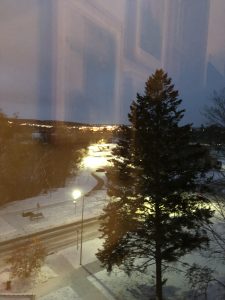 From my desk I can see the old asylum buildings that haven’t yet been renovated, and the cars snaking along Silver Drive. I can see across the open field and, in this early morning mist, the lights at Meijer’s store. I can see some of the river of lights along Division Street and a long way farther.If I get up now and look out one of the other bedroom windows, it’s quieter, paler. Big trees up close and the blessed stretch of wildness that still belongs to the asylum property. When there’s a full moon, the light in our bedroom is so bright it’s hard to sleep, but we don’t close the blinds. It begins over our heads and by early morning has moved to over my desk, a blue-white radiance.
From my desk I can see the old asylum buildings that haven’t yet been renovated, and the cars snaking along Silver Drive. I can see across the open field and, in this early morning mist, the lights at Meijer’s store. I can see some of the river of lights along Division Street and a long way farther.If I get up now and look out one of the other bedroom windows, it’s quieter, paler. Big trees up close and the blessed stretch of wildness that still belongs to the asylum property. When there’s a full moon, the light in our bedroom is so bright it’s hard to sleep, but we don’t close the blinds. It begins over our heads and by early morning has moved to over my desk, a blue-white radiance. In the kitchen, we look down on the semi-circular parking lot and the small garden in the middle that our neighbors lovingly care for. We chipped in for a new redbud tree this year to replace one of the huge ones that are dying one by one.At 5:30 or 6:00, people will start arriving for their personal training and spinning class. They’re the slick ones, mid-career, I imagine, swinging their bags, bouncing, focused. The dog walkers come out next, older, lazier, their dogs doing all the bouncing. The owners are only out to let the poor dogs pee. But still, you can tell they like the morning mist, the quiet.From this window, and three others, in the spring you can watch high school students all self-conscious and sometimes freezing in their sleek prom clothes, come to take pictures against our buildings. You can watch the dinner crowd, dressed up and heading for Stella’s downstairs. You can watch the owner of the flower shop downstairs carry armloads of flowers back and forth from her car.Twenty percent of Americans live in apartments. Well, we own our condo, but it’s the same, sharing a building with others. Elevated. Confined, and yet cozy in that way.
In the kitchen, we look down on the semi-circular parking lot and the small garden in the middle that our neighbors lovingly care for. We chipped in for a new redbud tree this year to replace one of the huge ones that are dying one by one.At 5:30 or 6:00, people will start arriving for their personal training and spinning class. They’re the slick ones, mid-career, I imagine, swinging their bags, bouncing, focused. The dog walkers come out next, older, lazier, their dogs doing all the bouncing. The owners are only out to let the poor dogs pee. But still, you can tell they like the morning mist, the quiet.From this window, and three others, in the spring you can watch high school students all self-conscious and sometimes freezing in their sleek prom clothes, come to take pictures against our buildings. You can watch the dinner crowd, dressed up and heading for Stella’s downstairs. You can watch the owner of the flower shop downstairs carry armloads of flowers back and forth from her car.Twenty percent of Americans live in apartments. Well, we own our condo, but it’s the same, sharing a building with others. Elevated. Confined, and yet cozy in that way.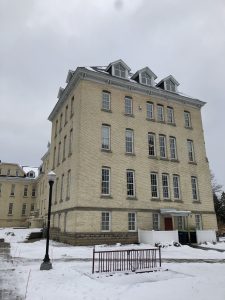 We miss stepping out on the ground; we miss having a porch; we miss having our own flowers; we miss having bird feeders down at the level where the songbirds live. If we didn’t have our lake cottage, maybe it would seem unbearable, to be so separated. But isolated? I think we felt less sense of community in our house with four walls. We knew our close neighbors, but only nodded at others. Here, there’s a different sort of selection that’s taken place. We who live here have a sense of all being in the same boat, or castle, that is. All having the same aesthetic.We're on the top, just below the attic condos. Snow makes it look bleak, but it is truly a castle. The old asylum’s rooms require that we bend to fit them; we don’t get to shape them to fit us. Everything's both old and new. New windows have to fit into old openings.So, what are the subtle shifts in me, since we moved here? I feel both more and less connected to the world of traffic, of weather. I can see it all from here, but it’s a bit like a movie. When I descend, the concreteness of rain, of snow, of cold, is a slap in the face. When we get back to the cottage in the spring, I'm running my fingers over the rocks and digging in the dirt, raking, anything to connect, connect. We are creatures of the earth, aren't we? High living is unnatural.Yet, we're also herd animals. Since the beginning of time, we’ve been trying to balance those urges: separate or together. I have a hunch that our political choices have a lot to do with how we see ourselves in this way. Do I defend my territory or share it? To what degree can I have both? P.S. Welcome new subscribers! And if you think someone else would like reading these Wobblies every few weeks, let them know that all they need to do is send an email to fleda@udel.edu, and say "Sign me up."
We miss stepping out on the ground; we miss having a porch; we miss having our own flowers; we miss having bird feeders down at the level where the songbirds live. If we didn’t have our lake cottage, maybe it would seem unbearable, to be so separated. But isolated? I think we felt less sense of community in our house with four walls. We knew our close neighbors, but only nodded at others. Here, there’s a different sort of selection that’s taken place. We who live here have a sense of all being in the same boat, or castle, that is. All having the same aesthetic.We're on the top, just below the attic condos. Snow makes it look bleak, but it is truly a castle. The old asylum’s rooms require that we bend to fit them; we don’t get to shape them to fit us. Everything's both old and new. New windows have to fit into old openings.So, what are the subtle shifts in me, since we moved here? I feel both more and less connected to the world of traffic, of weather. I can see it all from here, but it’s a bit like a movie. When I descend, the concreteness of rain, of snow, of cold, is a slap in the face. When we get back to the cottage in the spring, I'm running my fingers over the rocks and digging in the dirt, raking, anything to connect, connect. We are creatures of the earth, aren't we? High living is unnatural.Yet, we're also herd animals. Since the beginning of time, we’ve been trying to balance those urges: separate or together. I have a hunch that our political choices have a lot to do with how we see ourselves in this way. Do I defend my territory or share it? To what degree can I have both? P.S. Welcome new subscribers! And if you think someone else would like reading these Wobblies every few weeks, let them know that all they need to do is send an email to fleda@udel.edu, and say "Sign me up."
My Wobbly Bicycle, 158
 Is this heaven? The sidewalks are paved with gold. And the trees. Even as the colors mute, they’re still all these shades of softening brown. You wouldn’t think about politics if you didn’t have to. I usually post on Wednesdays, because supposedly that’s the day the most readers will read it, but election day is Tuesday. You going to read about leaves after that?
Is this heaven? The sidewalks are paved with gold. And the trees. Even as the colors mute, they’re still all these shades of softening brown. You wouldn’t think about politics if you didn’t have to. I usually post on Wednesdays, because supposedly that’s the day the most readers will read it, but election day is Tuesday. You going to read about leaves after that?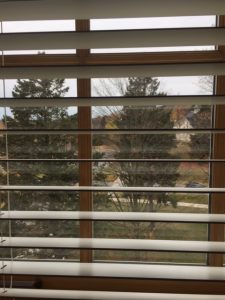 So this is what’s happening before. What’s happening is that an almost transparent spider is letting itself down my venetian blind by its almost invisible thread. It’s trusting the thread will hold. It has done this so many times before, and the thread has held. Its body has been reliable in that way, even without incantations or yard signs. The spider will continue, when we’re not looking, into the industry of its day.After it’s gone from my sight, morning will pass through the space where it was and the golden trees outside will pick up from there. Even the already bare ones will be drawing in their sap for safekeeping. Things are simple at heart. Maybe I can stare out absentmindedly for a few minutes and cause no harm from negligence. The leaves on the ground are keeping a world of creatures warm, and my spider knows how to signal the rest that there’s nothing to fear, here, from this woman who’s only interested in making clicking noises with her fingers, kind of like a cricket.I’ve already voted. The die is cast in more ways than one. I suspect all the screaming into the void grows less and less effective. Those people who haven’t yet “made up their minds” are either passive-aggressive and enjoy the attention of being “undecided,” or they’re living in a tree house of their minds, waiting for the next breeze to blow them one way or the other.
So this is what’s happening before. What’s happening is that an almost transparent spider is letting itself down my venetian blind by its almost invisible thread. It’s trusting the thread will hold. It has done this so many times before, and the thread has held. Its body has been reliable in that way, even without incantations or yard signs. The spider will continue, when we’re not looking, into the industry of its day.After it’s gone from my sight, morning will pass through the space where it was and the golden trees outside will pick up from there. Even the already bare ones will be drawing in their sap for safekeeping. Things are simple at heart. Maybe I can stare out absentmindedly for a few minutes and cause no harm from negligence. The leaves on the ground are keeping a world of creatures warm, and my spider knows how to signal the rest that there’s nothing to fear, here, from this woman who’s only interested in making clicking noises with her fingers, kind of like a cricket.I’ve already voted. The die is cast in more ways than one. I suspect all the screaming into the void grows less and less effective. Those people who haven’t yet “made up their minds” are either passive-aggressive and enjoy the attention of being “undecided,” or they’re living in a tree house of their minds, waiting for the next breeze to blow them one way or the other.  When I’m scared, when I’m depressed, I’ve learned that it helps a lot to hang onto tangible things. To appreciate dinner with friends and spiders that are as intricately made as my great grandmother’s tatting. Tatting is just a series of tiny knots and loops that end up being both beautiful and strong. You can go on with that metaphor yourself, if you’re inclined.
When I’m scared, when I’m depressed, I’ve learned that it helps a lot to hang onto tangible things. To appreciate dinner with friends and spiders that are as intricately made as my great grandmother’s tatting. Tatting is just a series of tiny knots and loops that end up being both beautiful and strong. You can go on with that metaphor yourself, if you’re inclined.  Yesterday I walked to the post office to mail my son a birthday present. (I walked a total of four miles yesterday, a record since my meniscus surgery.) I headed down Sixth Street, with the big old Victorian houses and old trees blindingly bright in the sun. That part of town is famous for its Halloween decorations, that were being set up as I walked by. Spiders, webs, ghosts, a purple dragon, dead people, tombstones. Literally thousands of kids Trick-or-Treat in that safe and generous neighborhood. There are monsters out there, truly, but these are the fake ones. These are the ones we all laugh at, to help us be brave when the real ones show up.
Yesterday I walked to the post office to mail my son a birthday present. (I walked a total of four miles yesterday, a record since my meniscus surgery.) I headed down Sixth Street, with the big old Victorian houses and old trees blindingly bright in the sun. That part of town is famous for its Halloween decorations, that were being set up as I walked by. Spiders, webs, ghosts, a purple dragon, dead people, tombstones. Literally thousands of kids Trick-or-Treat in that safe and generous neighborhood. There are monsters out there, truly, but these are the fake ones. These are the ones we all laugh at, to help us be brave when the real ones show up.
My Wobbly Bicycle, 157
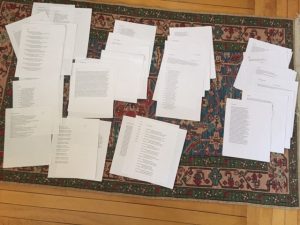 I’ve been gathering and arranging poems to see if they make up a book, yet. A whole nother level of attention. Some have been published, of course, but some I’m pulling up out of the dark of my computer files and examining with squinty eyes. I'm editing a lot. I don’t know. I feel as always, miserably insecure. But it’s useful to see what’s here. I may be writing the same poem over and over. Always there’s the agony, the despair. How many ways can that be held up to the light?I’m particularly alert to what others are writing. I just read a poem that ends, “Soothe me, soothe me, baby.” Can we be soothed, right now? But then I remember my first husband’s grandmother getting pessimistic before she died, saying how horrible everything was, how the world was coming to an end. It made me mad. I thought, “Your life is almost over, so you want to end everything, then? How narcissistic! Let the rest of us have our lives, our happiness.”
I’ve been gathering and arranging poems to see if they make up a book, yet. A whole nother level of attention. Some have been published, of course, but some I’m pulling up out of the dark of my computer files and examining with squinty eyes. I'm editing a lot. I don’t know. I feel as always, miserably insecure. But it’s useful to see what’s here. I may be writing the same poem over and over. Always there’s the agony, the despair. How many ways can that be held up to the light?I’m particularly alert to what others are writing. I just read a poem that ends, “Soothe me, soothe me, baby.” Can we be soothed, right now? But then I remember my first husband’s grandmother getting pessimistic before she died, saying how horrible everything was, how the world was coming to an end. It made me mad. I thought, “Your life is almost over, so you want to end everything, then? How narcissistic! Let the rest of us have our lives, our happiness.” 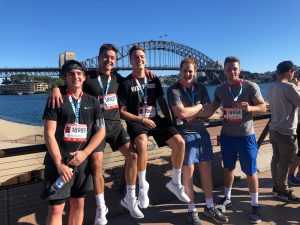 I watch our grandchildren, playing field hockey, running, singing, acting, making music of all sorts, studying for the LSATS, and so on, all enthusiastic, excited about what’s to come. Also I know there’s an epidemic of anxiety among young people. Some of our grandchildren have a lot of it. When I was young, I had a lot of anxiety. Anxiety comes with living. But there’s the almost unbearable weight of it now, the literal dying of our world, the short time we have to remedy it.Of course everything dies. Poems turn to dust, the earth will burn up, and so on. Consciousness is all. I would liken our role now as sitting at your mother’s bedside. She’s dangerously ill. You do what you can. You bring water, you get the multitude of details from the doctor, you read about the illness on line, but the most courageous thing you have to do is not sink. Not sink into despair, not pull away out of despair, and not make up artificially optimistic stories out of despair. You bring water, you smooth her forehead, you re-tell stories from the past. Sometimes you sing. Is your heart breaking? Not yet. You don’t know the outcome. Doctors don’t know, yet. They say, “time will tell.” They’re using their best medicine. You’re secretly adding herbs and prayers.Some poem titles, not mine, but indicative of what I mean: “Sentience as an Outing to the Zoo.” “I Never Used to Write about Birds,” “The Lights in the Sky Are Stars.” I see each one of these veering off from despair yet holding onto the thread of reality.I have been trying all morning to write a poem about the Victorian filigree on our cottage windows. I keep erasing because the poem keeps moving into despair and loss: a cliché, a knee-jerk reaction. What am I after? I don’t know. Something about the filigree attracts me. It’s uselessness. I am so tenderly attracted to uselessness.
I watch our grandchildren, playing field hockey, running, singing, acting, making music of all sorts, studying for the LSATS, and so on, all enthusiastic, excited about what’s to come. Also I know there’s an epidemic of anxiety among young people. Some of our grandchildren have a lot of it. When I was young, I had a lot of anxiety. Anxiety comes with living. But there’s the almost unbearable weight of it now, the literal dying of our world, the short time we have to remedy it.Of course everything dies. Poems turn to dust, the earth will burn up, and so on. Consciousness is all. I would liken our role now as sitting at your mother’s bedside. She’s dangerously ill. You do what you can. You bring water, you get the multitude of details from the doctor, you read about the illness on line, but the most courageous thing you have to do is not sink. Not sink into despair, not pull away out of despair, and not make up artificially optimistic stories out of despair. You bring water, you smooth her forehead, you re-tell stories from the past. Sometimes you sing. Is your heart breaking? Not yet. You don’t know the outcome. Doctors don’t know, yet. They say, “time will tell.” They’re using their best medicine. You’re secretly adding herbs and prayers.Some poem titles, not mine, but indicative of what I mean: “Sentience as an Outing to the Zoo.” “I Never Used to Write about Birds,” “The Lights in the Sky Are Stars.” I see each one of these veering off from despair yet holding onto the thread of reality.I have been trying all morning to write a poem about the Victorian filigree on our cottage windows. I keep erasing because the poem keeps moving into despair and loss: a cliché, a knee-jerk reaction. What am I after? I don’t know. Something about the filigree attracts me. It’s uselessness. I am so tenderly attracted to uselessness.  My tire pressure was down. I walked in to an auto repair shop in the town where our cottage is. A bunch of old men (photo isn't them, of course) were sitting around doing nothing. I watched for a minute or two before they saw me. They were perfectly happy sitting there chewing the fat. They didn’t seem to be worked up over anything. There were gaps when no one talked. Psychologists can talk about the usefulness of their getting together this way, but the joy of it, to me, seems to be the sheer uncompromising uselessness. I love those old men.
My tire pressure was down. I walked in to an auto repair shop in the town where our cottage is. A bunch of old men (photo isn't them, of course) were sitting around doing nothing. I watched for a minute or two before they saw me. They were perfectly happy sitting there chewing the fat. They didn’t seem to be worked up over anything. There were gaps when no one talked. Psychologists can talk about the usefulness of their getting together this way, but the joy of it, to me, seems to be the sheer uncompromising uselessness. I love those old men.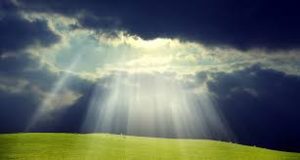 Something about just living. Something about filigree. Something about what Keats praised Shakespeare for being able to do: dwell in” uncertainties, mysteries, doubts, without any irritable reaching after fact and reason.”
Something about just living. Something about filigree. Something about what Keats praised Shakespeare for being able to do: dwell in” uncertainties, mysteries, doubts, without any irritable reaching after fact and reason.”
My Wobbly Bicycle, 156
The last thing I’ve been concerned with during the last few years is my website. It seemed pretty remote from the flesh and blood we’ve been dealing with here. When I discovered I’d lost four years of all site updates, I was so exasperated I thought maybe I should just shut it down. But no. What I do is write stuff. It needs to be available. So, onward. I’ve had my wonderful web guy, Mark Wise, help me update. Have you ever browsed this site? I’ll bet you just go straight here, to the blog post. 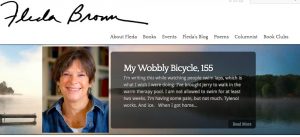 My site is really, really nice, I must say. Let me give you a Tour of the Tabs, Ta-Da!
My site is really, really nice, I must say. Let me give you a Tour of the Tabs, Ta-Da!
- Okay, you’re now on the “Fleda’s Blog” page. Go to top of page and far left to “Home.” On this page, besides the featured new book, I tell you about new published poems and essays. And give you links to sites where I’ve talked about poetry or have poems published.
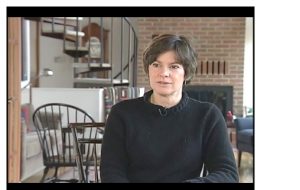 On the “About Fleda” page, notice the links to the side. The interesting one is “Video Interview.” You can see Younger Fleda here, when I was poet laureate of Delaware, in my living room, talking about how I write, what poetry does, with photos of my family—a classy video, courtesy of The University of Delaware. I have to say they were enormously supportive of my role in the state. I am wearing that sweater today, in honor. I can’t wear our old house. I still miss it.
On the “About Fleda” page, notice the links to the side. The interesting one is “Video Interview.” You can see Younger Fleda here, when I was poet laureate of Delaware, in my living room, talking about how I write, what poetry does, with photos of my family—a classy video, courtesy of The University of Delaware. I have to say they were enormously supportive of my role in the state. I am wearing that sweater today, in honor. I can’t wear our old house. I still miss it.
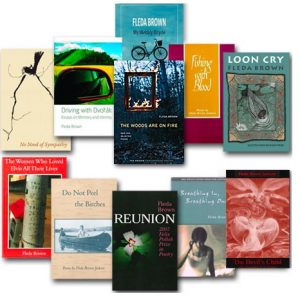 The “Books” page has descriptions of all my books and links to buy them. They’re all still available. Really.
The “Books” page has descriptions of all my books and links to buy them. They’re all still available. Really.
- The “Events” page is a mess, ever since the catastrophic loss of four years. And it’s been impossible for me to flit around the country these days. That’s okay. I am not a great fan of flitting, anyhow.
- “Fleda’s Blog” page, “My Wobbly Bicycle,” has some archives, but you’ll notice they skip from January 2014 to April 2018. I started the posts in 2011. That’s seven years! The site is older than that.
- The “Poems” page is all new. Free poems here. From The Woods Are On Fire.
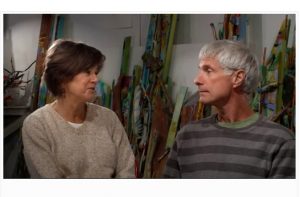 Also on this page there are two “Multimedia” links. The first is a short and utterly gorgeous video (made by David Poinsett) of Bill Allen and me talking about our exhibit at the Dennos Museum in Traverse City, with images of Bill’s work and what the whole thing looked like on the walls at the museum.
Also on this page there are two “Multimedia” links. The first is a short and utterly gorgeous video (made by David Poinsett) of Bill Allen and me talking about our exhibit at the Dennos Museum in Traverse City, with images of Bill’s work and what the whole thing looked like on the walls at the museum. 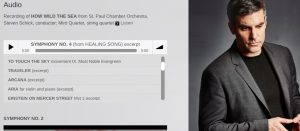 The second sends you to Kevin Puts’ website, where you can listen to a snippet of “Einstein on Mercer Street,” the piece we did together for the Pittsburgh New Music Ensemble that’s since been played in many places. The libretto poem is in The Woods Are On Fire.
The second sends you to Kevin Puts’ website, where you can listen to a snippet of “Einstein on Mercer Street,” the piece we did together for the Pittsburgh New Music Ensemble that’s since been played in many places. The libretto poem is in The Woods Are On Fire.
- The next tab describes my column for the Record-Eagle and on-air for Interlochen Public Radio.
- The last is an offer to come visit your book group or any other group. In spite of my lack of enthusiasm for travel, I enjoy doing this if I can reach you easily, or if you pay my plane ticket.
If you have comments or thoughts about the site, please let me know. If you want email notice of new Wobbly Bicycle posts instead of depending on catching them on Facebook, send me an email at fleda@udel.edu.
My Wobbly Bicycle, 155
 I’m writing this while watching people swim laps, which is what I wish I were doing. I’ve brought Jerry to walk in the warm therapy pool. I am not allowed to swim for at least two weeks. I’m having some pain, but not much. Tylenol works. And ice. When I got home from the hospital after my meniscus surgery, I lay on the sofa for two days, knee iced ten minutes out of every hour. When you’re on drugs, that all seems pretty floaty and wonderful, like a warm pool. I watched the Kavanaugh hearings. Correction. I’d missed Christine Blasey Ford’s interview, so I was watching Kavanaugh. Correction. I was watching Christine Blasey Ford on my phone, held directly in the path of the TV on which Kavanaugh was performing. I would switch back and forth. Both of these in my vision. Everything is in the world. More than I knew. The culture, as many have said before me, is popping open like a big hunky boil, spewing pent-up, infectious vitriol everywhere.
I’m writing this while watching people swim laps, which is what I wish I were doing. I’ve brought Jerry to walk in the warm therapy pool. I am not allowed to swim for at least two weeks. I’m having some pain, but not much. Tylenol works. And ice. When I got home from the hospital after my meniscus surgery, I lay on the sofa for two days, knee iced ten minutes out of every hour. When you’re on drugs, that all seems pretty floaty and wonderful, like a warm pool. I watched the Kavanaugh hearings. Correction. I’d missed Christine Blasey Ford’s interview, so I was watching Kavanaugh. Correction. I was watching Christine Blasey Ford on my phone, held directly in the path of the TV on which Kavanaugh was performing. I would switch back and forth. Both of these in my vision. Everything is in the world. More than I knew. The culture, as many have said before me, is popping open like a big hunky boil, spewing pent-up, infectious vitriol everywhere. 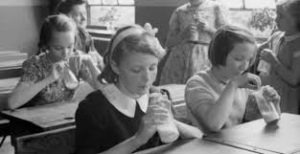 So was my childhood a lie? Those fifties in which we were all “alike,” all white, all middle-class, except for those who weren’t, the ones we prayed for and gave money to. Those fifties that were bordered by our border, that were only mildly interested in what happened out there. Out there was so far away. Ignorance Were Us. I can trace a whole lifetime of my own ignorance, what it got me. It’s hard for me to see the me of me back then, getting pulled in destructive directions, over and over. I don’t regret my past, but I am often sad for it, for me. Likewise, I suspect America is feeling at last what was not felt, so that’s not all bad.
So was my childhood a lie? Those fifties in which we were all “alike,” all white, all middle-class, except for those who weren’t, the ones we prayed for and gave money to. Those fifties that were bordered by our border, that were only mildly interested in what happened out there. Out there was so far away. Ignorance Were Us. I can trace a whole lifetime of my own ignorance, what it got me. It’s hard for me to see the me of me back then, getting pulled in destructive directions, over and over. I don’t regret my past, but I am often sad for it, for me. Likewise, I suspect America is feeling at last what was not felt, so that’s not all bad.  I do wonder what we’re missing. What’s under the surface, still. What IS the surface, do pray? There are so many surfaces, so many screens, glittering in the light so that all we’re seeing is reflection. We’re fiercely dredging up what we didn’t see. I just read that Purdue Pharma, who developed OxyContin and convinced doctors that it was not addictive, has now received a patent for a new drug to treat the addiction. All this and more. I used to think people got wiser as they got older. No I didn’t. That’s knee-jerk. I looked at my parents and grandparents. Some of them seemed smart, but not wise. Wikipedia says wise is possessing experience, knowledge, good judgment. The first two are easy. You can’t avoid experience. And you’re bound to learn stuff over a lifetime. The third is the stickler.
I do wonder what we’re missing. What’s under the surface, still. What IS the surface, do pray? There are so many surfaces, so many screens, glittering in the light so that all we’re seeing is reflection. We’re fiercely dredging up what we didn’t see. I just read that Purdue Pharma, who developed OxyContin and convinced doctors that it was not addictive, has now received a patent for a new drug to treat the addiction. All this and more. I used to think people got wiser as they got older. No I didn’t. That’s knee-jerk. I looked at my parents and grandparents. Some of them seemed smart, but not wise. Wikipedia says wise is possessing experience, knowledge, good judgment. The first two are easy. You can’t avoid experience. And you’re bound to learn stuff over a lifetime. The third is the stickler.  Judgment according to whom? I think about my “decision” to get married when I was 17. Who can say that wasn’t good judgment? When I hold a microscope to the moment of choice, I can’t find one. There was my DNA, and an evolution of myriad events that depended on breaking events, a soup that oriented me one way, and not another. I could no more “decide” than the man in the moon, as my mother would have said.
Judgment according to whom? I think about my “decision” to get married when I was 17. Who can say that wasn’t good judgment? When I hold a microscope to the moment of choice, I can’t find one. There was my DNA, and an evolution of myriad events that depended on breaking events, a soup that oriented me one way, and not another. I could no more “decide” than the man in the moon, as my mother would have said.  TV is amazing. I try to think what it was like before we could watch people, live, in action, from afar. TV allows me to see the slow shift, or lack of it, of the Senate committee members’ minds. I see their vulnerability, their fear, their ignorance, their hiding, their bravery. When my eyes are on both screens, my little phone screen and the TV’s, there is the full range, living color, not villain and hero, but the thousand tiny glances, movements, word choices, that make up what is simply the case. What to “do” about it will come, I’m guessing, the same way. Bit by bit, evolving.
TV is amazing. I try to think what it was like before we could watch people, live, in action, from afar. TV allows me to see the slow shift, or lack of it, of the Senate committee members’ minds. I see their vulnerability, their fear, their ignorance, their hiding, their bravery. When my eyes are on both screens, my little phone screen and the TV’s, there is the full range, living color, not villain and hero, but the thousand tiny glances, movements, word choices, that make up what is simply the case. What to “do” about it will come, I’m guessing, the same way. Bit by bit, evolving.
